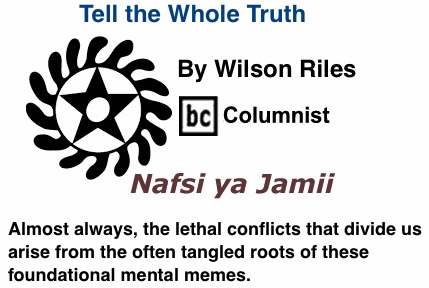




In the “creases” and “folds” of “America’s” Weltanschauung, hidden tendencies are encouraged and perspectives exist that are downright nasty. These mental viruses (memes), these shades that cast shadows over clear consciousness, and these mind-sight-blinkers often go unnoticed and overlooked for hundreds of years. They shape how we see the world and what we “know” of the real world. Sometimes we are lucky enough to find the paths that trace the development of these intellectual-cultural-fur-balls and sometimes we have the chance to clean up our “mental guts.” Often these discoveries are made at times of great crisis. And too infrequently, even then, elements remain hidden that threaten us at our foundations. Almost always, the lethal conflicts that divide us arise from the often tangled roots of these foundational mental memes.
What am I talking about?
Let me unveil the latest example that I am aware of as follows. How do we perceive or measure human happiness and society’s progress towards improving such? This concept is almost permanently encrusted with memes that lead to really nasty results, paralyzed thinking, and a strong sense of hopelessness that change will ever occur. An off-world alien would undoubtedly be flabbergasted that a sentient species could be so thoroughly tangled up over the fundamental question of species happiness and health. Too many of us are still so “deafened and blinded” by misaligned memes that we believe that slavery can be good for a people in any circumstances! Too many believe that it is OK to snatch a people’s children, transport them hundreds of miles, punish them to keep them from speaking their language, and indoctrinate them with self-deprecating, foreign understandings and behaviors. Too many still believe that the accumulation of material things with limited utility beyond acquisition is a measure of happiness and success. Currently nearly every nation on the planet uses calculations of societal well being that measures the material accumulation in the wake of extreme misery and disaster, the material accumulation necessary to fulfill basic needs, and the material accumulation in excess of basic needs equally. No distinction is made among these three ends for accumulation and the direct measures of health and well being are essentially ignored. This is a glaring example of our seeming total capture by the memes of Western culture as we tumble toward species extinction.
I am, of course, talking about an aspect of rapacious global capitalism. And I join with the readers of these pages in calling for the elimination of this bizarre operational belief system that is founded on power over others, the unreality of infinite planetary materiality, and an unending reliance on human creativity to find brief paths to avoid disaster. Capitalism evolved from mercantilism which evolved from feudalism with a carefully structured perception of humankind’s improvement that hid the inhuman atrocities. That is why opposition to capitalism is not sufficient for turning us in a fundamentally new direction. We must reach back in time and reach deep down to those fur-balls of memes that are entangled in the foundations of our Weltanschauung and that blind and deafen us to the futility of our liberal (less radical) prescriptions. Otherwise we are libel to reinvent the horrors in any new liberal formation. I was recently pleased and surprised to find a historical look at the innards of capitalism - accounting - that called for radical restructuring of our national measurements of societal health.
Double Entry: How the Merchants of Venice Created Modern Finance
by
Jane Gleeson-White was the book that presented this historical
review of accounting. One would think that the history of business
accounting would be very, very boring and of no importance. So I
thought also, except for two experiences that hooked me into reading
this history. Experience has taught me that it is often the boring
stuff that contains the deepest hidden meme entanglements that trip
us up. In the murky pool of cultural beliefs that we think are
settled, certain, and resolved lurks these misused or misaligned
memes. I also - while channel surfing - happened on to CSPAN’s Book
TV series where author Gleeson-White was talking. I paused to watch a
young Caucasian woman from Australia talk about ancient Venice. A
number of threads of operational historical memes crossed.
Ms. Gleeson-White writes about the mid-Thirteenth Century when “…Venice put the demands of commerce high above the rule of the Church.” The Holy Roman Catholic Church stood, ostensibly, in opposition to the sin of usury (making money off money) and rallied all of Christendom to fight the Islamic power of the time, the Ottoman Turks who had captured the great Mediterranean trading center of Constantinople. The Church invoked frequent Crusades (Jihads) against the Islamic world and Christian knights and armies traveled through Northern Italy leaving payments and war booty on the way South and again on their return. The Venetian Republic (a city state) made peace with the Ottoman Empire and handsomely benefited from trading between the warring Christian and Islamic power centers. Using the methods of Arabic traders and the mathematical accounting efficiency of calculating with Arabic numerology - as opposed to the clumsiness of Roman numerology - the Venetians not only prospered; they became a commercial learning center that drew students from all over the known world. At its most basic, international global trading is rooted in cultural war.
The book, Double Entry, points to the teaching of Luca Pacioli as the source for the understanding “that the purpose of every merchant is ‘to make a lawful and reasonable profit so as to keep up his business.’” In that era “when this was not so self-evident the tools for calculating profit - especially the Venetian bookkeeping system - were not widely used.” The mystery of Arabic numerology was encapsulated in the religious fervor for salvation and well being that was being squandered by the corruption that was present in the Medici dominated Catholic Church, positively coloring the fabulous success of Venetian merchants. These newly successful merchants lavished riches on the Church and on artists such as Leonardo di Vinci and on the newly invented printing presses that spread their commercial “gospel” far and wide. It signaled the birth of a powerful competing value system that enveloped the Church’s rejection of science and offered the salvation of pre-death status in society and riches based on the accumulation of materiality.
The Holy Roman Church itself became “drunk” with imperialism, wars, and decadence. It turned its back on “Sabbath economics” and the First Century Christian abhorrence for suppression of the poor. Christianity in much of Medieval Europe regarded charging any interest for loans as sinful. This abhorrence for taking advantage of the poor has universality. “Some of the earliest known condemnations of usury come from the Vedic texts of India. Similar condemnations are found in religious texts from Buddhism, Judaism, Christianity, and Islam.” (Wikipedia) Still today, Islam in many parts of the world forbids the application of interest. Profit, which is a form of interest, is foundationally a sin. Rapacious global capitalism has proven itself sinful.
Ms. Gleeson-White’s book goes on to trace the evolution of double entry bookkeeping (accounting) to its ignoble status today, what with LIBOR, Enron, AIG, etc. The book begins and ends with a lament for an alternative calculation for measuring human happiness and worth other than that derivative of Double Entry accounting, the Gross National Product or the Domestic National Product. No one should in any way confuse national prosperity with the GNP. A misstep 600 years old ought not to be influencing us today. No congressperson, especially not Keith Ellison, need feel bad that cuts in the U.S. national defense spending means a reduction in the GNP since the GNP is a misreading of national well being and because defense spending is the type of government spending that has the lowest multiplier rate of spinoff benefits to other parts of the economy. There are a number of other measurements available but it will take more of us unmasking the tangled memes buried deep within our psyches for us to use them and hear them with understanding. It is time to tell the whole truth.

BlackCommentator.com Columnist, Wilson Riles, is a former
 |






